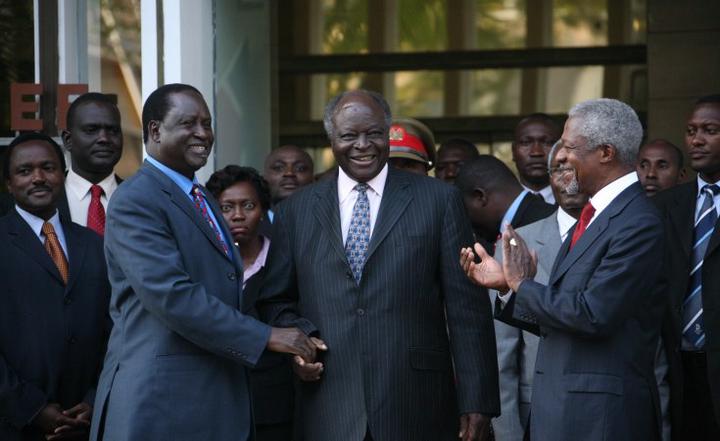Legitimacy, Capacity, and Conflict Resolution in Africa
 Kofi Annan successfully mediates in the 2007 elections crisis in Kenya
Kofi Annan successfully mediates in the 2007 elections crisis in Kenya
The current scholarly literature on the international mediation of civil wars draws predominantly on a rationalist-materialist perspective. This perspective suggests that the ticket to mediation success is the material manipulation of the bargaining environment by third parties with a high degree of economic and military resources. The central argument in this books is that legitimacy also determines outcomes of mediation because if a mediator has legitimacy, it can continue to look for a mutually satisfactory outcome and try to pull the conflict parties toward compliance. The reason why legitimacy matters so much is that if a mediator has legitimacy, it can continue to look for a mutual satisfactory outcome and try to pull the conflict parties towards compliance, but if a mediator loses legitimacy, no amount of material resources will prove sufficient in mediating the conflict. In other words, material capacity in the form of economic and military resources may be useful to successfully mediate a conflict, but it is rarely sufficient.
Through scrutinising international mediation processes in civil wars in Africa, the book develops a theory that explains how mediators are effective because of a high degree of legitimacy rather than military or economic capacity. The book shows that legitimacy matters by systematically comparing the effectiveness of African and non-African third parties. African third parties are typically considered ineffective because of a low degree of economic and military capacity. However, they effectively mediate civil wars in Africa because of a high degree of legitimacy, which is a result of a strong conviction within the African society of states that African mediation is the most desirable type in conflicts there.
Drawing on data from the Uppsala Conflict Data Program, supplemented with unique data on mediation efforts in Africa between 1960 and 2017, the book presents quantitative evidence supporting the effectiveness of African third parties. Compared to non-African ones, African third parties are far more likely to conclude negotiated settlements that are more likely to be durable.
Four case studies – focusing on several mediation efforts in civil war in Angola, the north-south Sudan war, the civil war in Darfur, and the civil war in Burundi – examine the causal mechanisms that explain the effectiveness of African mediation. These cases suggest that third party legitimacy is central to mediation success in Africa.
This is the first systematic study that compares African and non-African mediation efforts. Theoretically, this study deviates from much of the literature that puts forward solely rationalist-materialist explanations of mediation success. By bringing legitimacy to the forefront, this book supplements the current mediation literature that emphasizes material sources of power and ignores social structures.